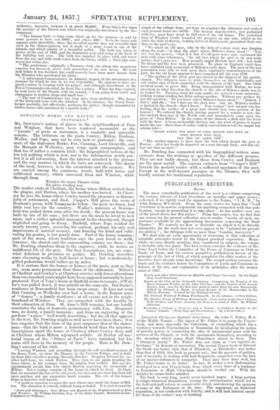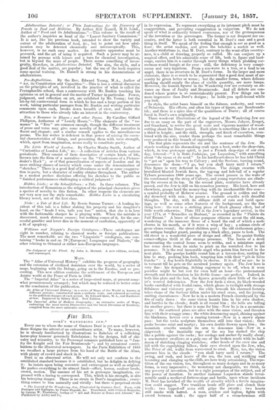PUBLICATIONS RECEIVED,
BOOKS.
The most remarkable publication of the week is a volume comprising the various labours of Lord Overstone on metallic and paper money ; collected, if we rightly read the signature to the Notice, "J. R. M.," by John Ramsay M'Culloch. From the same notice we learn that "Lord Overstone is in nowise responsible for anything connected with this publication, except in permitting it to take place : he has neither seen ono of the proof-sheets nor this notice." From this source, too, we find that one reason for the present collection was to render "works of such importance available in the approaching discussions respecting the Bank Charter." We scarcely see how so desirable an object is to be directly attainable, for the work does not even appear to be "printed for private circulation"; the titlepage tells no more than "London, MDCCOLY11."
We shall take an early opportunity of returning to this collection of scientific principles tested by the largest practical experience. Meanwhile, we may shortly mention, that, considered by subjects, the volume is divisible into two parts. The first section contains the evidence of Mr. Jones Loyd before the Committee of the House of Commons in 1840 on Banks of Issue, and the various pamphlets published in favour of the principle of the Act of 1844, of which pamphlets the older readers of the Spectator have already some knowledge. The second section contains the
tracts and the evidence before the Committees of Lords and Commons in defence of the Act, and explanation of its principles, after the money crisis of 1847.
Tracts and other Publications on Helaine and Paper Currency. By the Right Hon. Lord Overstone.
Russia af the Close of the Sixteenth Century. Comprising the Treatise of the Hasse Common Wealth, by Dr. Giles Fletcher; and the Fravels of flit Jerome Horsey, Ent., now for the first time printed entire from his own Manuscript. Edited by Edward A. Bond, Assistant-Keeper of the Manuscripts in the British Museum. Printed for the Ilakluyt Society.
The Poetical Works of William Wordsworth. In six volumes. A New Edition. The Earlier Poems of William Wordsworth. Cormeted as in the latest editions.
With Preface, and Notes showing the Text as it stood in 1815. By William Johnston.
Bermuda, a Colony, a Fortress, and a Prison; or Eighteen Afonths In the Somers' Islands. (With Map and Illustrations.) By a Field-Officer.
Liturgical Purity our Rightful Inheritance. By John C. Fisher, M.A. of the Middle Temple.—The object of Mr. Fisher is to purge the Prayerbook, and more especially the Catechism, of everything which has a tendency towards Tractarianism or Romanism by inculcating the notion of priestly power, or connecting the idea of sacramental grace with the services of the Church, or with the sacraments themselves, according to the meaning which many High Churchmen attach to them. This " liturgical purity" Mr. Fisher does not claim as "our rightful inheritance" by descent or succession. The second Prayer-book of Edward the Sixth was better than that of Elizabeth, as Elizabeth's was better than that of 1662 (the book in present use) ; but the pressure of politics, and of necessity in dealing with half-Romanists, compelled even the best of our martyr-reformers to temporize. They may have done well, but Mr. Fisher wants to do better. In fact, he wishes a new Reformation developed in a new Prayer-book, from which every trace of a tendency to Romanism or High Churchism should be weeded out. With the Articles he seems better satisfied.
The book is very long, nearly seven hundred pages. A large portion is religio-historical disquisition, tracing the circumstances which led to the half-and-half reform in considerable detail, and showing the opinions of some of the Reformers at the time. The argument, an historical exposition, is not conducted with felicity, and it will lack interest except for those of the writer's way of thinking.
_Adulterations Detected; or Plain Instructions for the Discovery of Frauds in Food and Medicine. By Arthur Hill Hassell, M.D. Lend., Author of "Food and its Adulterations."—This volume is the result of the author's inquiries as head of the "Lancet Sanitary Commission." It is not, like his previous book, intended to show the variety and extent of the adulteration of food, &c., but to point out how adulteration may be detected chemically and microscopically. This, however, is no such easy matter. An extensive apparatus must be procured, and the art of using it acquired. Such a power may be attained by persons with leisure and a turn for chemical investigation, but is beyond the mass of people. There seems something of incongruity, therefore, in Adulterations Detected. The aim, the style, and a good deal of the matter, are popular ; but the use of the book requires some special training. Dr. Hassell is strong in his denunciations of adulterations.
Pre-Rafrellitism. By the Rev. Edward Young, M.A., Author of "Art, its Constitution and Capaeities."—This is less a critical discussion on the principles of art, involved in the practice of what is called the Prseraphaelite school, than a controversy with Mr. Ruskin touching his opinions on art in general and the merits of Turner in particular. Power, judgment, and reflection on art, are exhibited by Mr. Young; but the bit-by-bit controversial form in which he has cast a large portion of his work, taking particular passages from Mr. Ruskin and writing particular comments upon each, breaks down breadth of view, and limits the attraction to those who already take an interest in the controversy.
Eva, a Romance in Rhyme ; and other _Poems. By Caroline Giffard Philipson, Authoress of "Lonely llours."—The elements of the "romance" in "Eva" are common enough, though the different treatment of prose and verse may give some novelty of form. The narrative is fluent and elegant; and a similar remark applies to the miscellaneous poems. The fair writer is deficient in that power of seizing the essential characteristics of things, and presenting them with terse strength, which, apart from imagination, seems really to constitute poetry.
The Little World of London. By Charles Manby Smith, Author of "Curiosities of London Life," &c.—A collection of articles from various periodicals. They consist of facts descriptive of certain kinds of life, thrown into the form of a narrative—as the "Confessions of a Picturedealer's Hack" ; or of that generalization of aspects of London and its more striking classes of society which come under the denomination of "sketches." There is a good deal of literalness as well as some exaggeration in parts, but a character of reality obtains throughout. The author in a modest preface disclaims offering his sketches to the public as "finished performances challenging a critical judgment."
Hidden Links; or the Schoolfellows: is Tale. In three volumes. The introduction of Romanism as the religion of the principal characters gives a species of novelty to this fiction. In. other respects the elements are not very new nor the style remarkable. Hidden _Links is a circulating library novel, not of the first class.
Niobe : a Tale of Real Life. By Bessie Saranas Turner.—A leading incident of this tale is a father staking his property and his daughter's hand, on the "heads I win, tails you lose" notion, that she is in love with the fashionable sharper he is playing with. When the mistake is discovered, much distress ensues; but nothing comes of it, for the successful gambler and lover dies in the moment of exultation, apparently of a fit of apoplexy.
7Vil4ams and Sorgate's Foreign Catalogues.—These catalogues are eight in number, relating to classical works or foreign publications. The most remarkable are the two " Linguistic " catalogues, one containing "books in and on 70 [European] Languages and Dialects," the other relating to Oriental or rather non-European languages.
The Judgment of the Flood. By John A. lIeraud. A new edition, revised, and rearranged.
MAPS.
The "Atlas of Universal History" exhibits the progress of geography ftnil the extension of civilized dominion over the world, by a series of maps, beginning with the Deluge, going on to the Exodus, and so proceeding. This new edition contains the settlement of the European and Asiatic world at the Peace of Paris in 1856.
The "Imperial Atlas" is a series of e maps, at present somewhat promiscuously arranged ; but whichmay be reduced to better order on the conclusion of the publication.
An Atlas of Universal History ; in a series of Maps of the World as known at different periods ; constructed upon a uniform scale, and coloured according to the political changes of each period. By Edward Quin, MA., and Barristerat-law. Engraved by Sidney Dalt New Edition.
The Imperial Atlas of Modern geography: an extensive series of Maps, embracing the most recent Discoveries and the latest Divisions of Territory, Compiled from the most authentic sources.



































 Previous page
Previous page